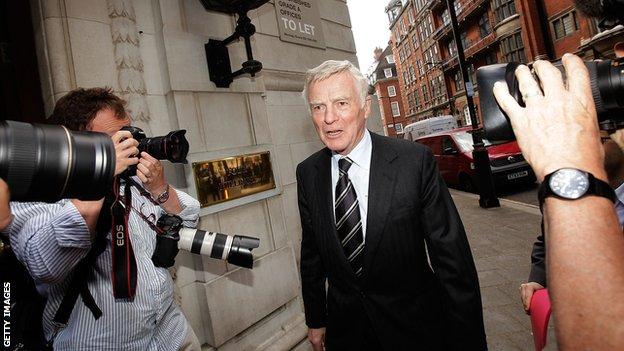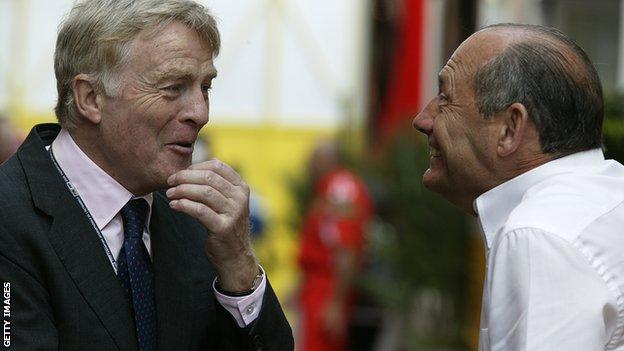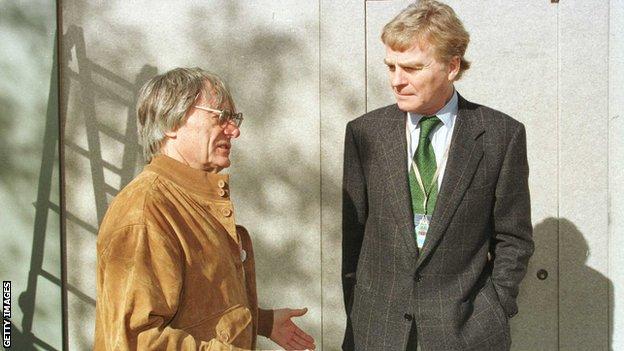Max Mosley obituary: A dizzying intellect; an intimidating man
Max Mosley #MaxMosley


Max Mosley, who has died aged 81, was one of the most influential and important figures in motorsport over the last half-century – and also among the most controversial.
With a brilliant intellect and a devious, sometimes malicious mind, he was arguably better suited to a career in politics.
But he was the son of the 1930s British fascist leader Sir Oswald Mosley, and in his youth was involved in his father’s post-war political party the Union Movement. He realised his personal history would prevent him from entering parliament, so he directed his attention towards motorsport instead.
Mosley was a fascinating and contradictory character. Urbane and charming, he was never less than engaging on a personal level.
The former Formula 1 boss Bernie Ecclestone, with whom Mosley engaged in a partnership that dominated the sport for more than three decades, said his death was “like losing a brother”, and paid him a warm if typically brief tribute.
But not everyone felt so kindly towards this patrician and sometimes patronising figure. Mosley had a vindictive streak. His political and legal abilities were widely admired, but not everyone found him easy to like.
Among those to suffer most from Mosley’s darker attributes was the former McLaren boss Ron Dennis. There was an icy disdain between the two men – Mosley delighting in trying to humiliate a personality he saw as uneducated, unsophisticated and gauche; Dennis in return finding Mosley a particularly unpleasant kind of condescending aristocrat.
Their mutual antipathy was at the heart of two of the biggest political controversies in F1 over the last 30 years.
Dennis, along with fellow team owners Frank Williams and Ken Tyrrell, did everything he could to fight what he saw as the theft involved in transferring the sport’s commercial rights from the teams to Ecclestone’s own companies in 1995, and the legal battle dragged on for three years before it was settled.
Mosley bore a grudge about that for a decade, and paid Dennis back in the ‘spy-gate’ scandal of 2007, when McLaren’s chief designer was found in possession of nearly 800 pages of confidential Ferrari technical information.
It took two hearings before Mosley was able to get the sport’s governing body that he ran to find McLaren guilty, and when he did he imposed an unprecedented $100m fine on the team, hoping it would bring Dennis down.
Infamously, during a photoshoot at a subsequent grand prix intended to demonstrate that there were no hard feelings between the two men, Mosley turned to Dennis and whispered in his ear: “Five million is for what you did, 95 is for being a ****.”
Mosley’s nearly 20 years running motorsport as president of the FIA were marked by widespread unease within the F1 teams and wider community about his method and approach.
But there is no doubting the scale of what he did for the sport.
Most importantly, following the death of Ayrton Senna, he was a steadying hand in a time of chaos. For a brief period, the future of the sport seemed as if it might be under threat. Mosley recognised the seriousness of the situation, and instigated a campaign to improve safety that has continued ever since.
Equally, in the FIA presidency’s parallel role in responsibility for road-car matters, he was instrumental in working with the European Union to force the manufacturers to increase the safety of their products.
He was the driving force behind the EuroNCAP programme of mandatory crash tests, which has played a significant role in reducing the number of deaths in road accidents.
 Max Mosley and Ron Dennis shared a mutual antipathy A dizzying intellect; an intimidating man
Max Mosley and Ron Dennis shared a mutual antipathy A dizzying intellect; an intimidating man
Ecclestone and Mosley proved an effective and productive partnership at the helm of F1, the intellectual approach of Mosley, who studied physics at Oxford and went on to become a barrister, the perfect foil for the streetwise approach and barely concealed threat of Ecclestone, a former south London car dealer.
For the F1 teams, Mosley must have been a nightmare to deal with. He combined his intelligence with what came close to amorality, and his intellect and authority ensured it was all but impossible to win an argument with him.
He mercilessly used vague, catch-all clauses in the F1 regulations to pursue the changes he wanted, and was never shy about using the threat of a broad clause about “bringing the sport into disrepute” and the disciplinary powers it contained to bring people into line.
Whatever was thrown at him, however powerful the argument against his position, Mosley could be guaranteed to say: “Well, that’s a very good point, but of course the problem with it is…” There would follow a persuasive, cleverly phrased argument, quite often based on sophistry.
Tall and lean, he was also an unsettling, intimidating figure.
A former assistant once described walking into his office on a day on which Mosley was particularly upset about some turn of events. He found Mosley pacing back and forth chanting at the ceiling in Latin. The man decided this was perhaps not the time to disturb Mosley, and beat a quiet retreat.
The road to power
Mosley’s time in motorsport began in the late 1960s. After a brief career as a racing driver, in which he rose to compete in Formula 2, he co-founded the racing car constructor March in 1970 with Robin Herd, Alan Rees and Graham Coaker, the company name formed from the initial letters of their surnames.
The company won its first three Formula 1 races in 1970 and later diversified into other forms of motorsport, but by the end of 1977 Mosley had left the company to work full-time in motorsport politics.
He joined forces with Ecclestone at the Formula 1 Constructors’ Association (FOCA) and the two fought a bitter political war for control of the sport with Jean-Marie Balestre, the combustible president of the governing body, then called FISA, in 1980 and 1981.
The arguments were finally settled with the so-called Concorde Agreement, which essentially set up the structure of the sport that remains in place to this day – Foca held the commercial rights, while Fisa controlled the rules.
Mosley left motorsport in 1982 to work for the Conservative party but returned four years later to become president of the Fisa manufacturers’ commission.
He used the role as a springboard to launch a successful bid for the presidency of Fisa in 1991. Mosley then became president of its parent body the FIA, the international automobile federation, when the two were merged in 1993.
 Mosley and Bernie Ecclestone came together to fight for political control of F1 Senna’s death and a safety crusade
Mosley and Bernie Ecclestone came together to fight for political control of F1 Senna’s death and a safety crusade
Mosley quickly established a modus operandi as a president who was proactive, provocative and confrontational.
In 1993, he instigated a ban on driver aids such as traction control and active suspension against the wishes of the teams. And his combative approach, in which he used a vast intellect to devise clever strategy and often Machiavellian tactics, continued over his near two-decade stay in his role.
His biggest challenge came a year later, when Senna was killed in an accident at the 1994 San Marino Grand Prix that was broadcast live around the world.
As a global sporting icon, and an almost God-like figure in his native Brazil, Senna’s death raised serious questions about safety in Formula 1, and world leaders contacted Mosley questioning the sport’s position.
Mosley immediately introduced a series of changes to the cars, setting in motion a new approach whereby the safety of the drivers and spectators was central to the ethos of motorsport and attempts were made to constantly improve it.
In this, he was backed by Ecclestone, and supported by the FIA medical delegate Professor Sid Watkins and the FIA F1 director Charlie Whiting. Together, they changed the face of the sport.
The beginning of the end
But the longer Mosley remained in situ, the more F1 teams grew uncomfortable with what they saw as an authoritarian and arbitrary approach, along with sometimes questionable methods and motives.
Mosley’s reputation with the F1 teams was badly damaged by his deal to remove the sport’s TV rights from Foca and sell them on a 100-year lease to Ecclestone’s companies for what many considered to be a paltry one-off figure of $360m in 1995.
His antagonistic leadership style continued through the 2000s and the beginning of the end of his time at the FIA came when the News of the World published a story containing pictures of him engaging in a sadomasochistic orgy.
Far from embarrassed, Mosley fought the initial outcry, and somehow survived it. But when in 2009 he tried to introduce a budget cap into F1, the big teams had had enough. They were led by Ferrari, and their then-president Luca Di Montezemolo, another man with whom Mosley had a tempestuous personal relationship.
The latest of many political fights began, and this time Mosley lost. The major teams and car manufacturers threatened to set up a rival championship. To bring them back into the fold, Mosley had to agree not to seek a further term as president when his latest one expired in October 2009.
It brought to an end a monumental career, but Mosley switched immediately to a new one, becoming a campaigner for privacy rights and taking the fight to newspapers and even internet giant Google.
Then, in 2018, allegations of racism emerged when political leaflets he had published in the 1960s came to light.
In an interview with Channel 4 News, Mosley conceded that a passage within the leaflets “probably is racist”, although he denied either publishing the leaflets or committing perjury in his legal case against the News of the World.
Since then, his health declining, Mosley had slipped from public view.
The controversies surrounding his personality and views will always make him a complex and to many an unsavoury figure, but the huge impact he had on motorsport over four decades is undeniable.